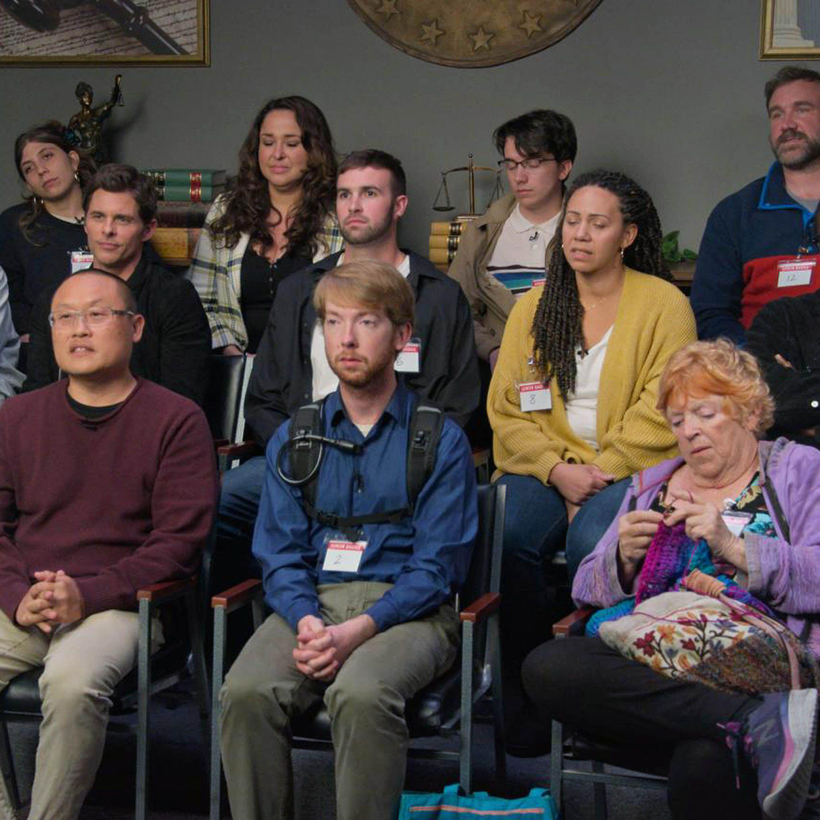The premise is simple. A film crew is making a documentary about what it’s like to serve on a jury. The participants will preside over a trial of workplace negligence, giving viewers an inside look at their experiences reaching a verdict. Except there’s no documentary. The premise is fake, and everyone involved except our unwitting hero, Ronald Gladden, is an actor.
For lovers of reality TV, this all may sound familiar. Before Keeping Up with the Kardashians, Real Housewives, and Love Island, there was An American Family, a 1973 series that revealed the inner workings of a WASP-y California family. Not too long after, the Brits followed suit with The Family. Both shows began innocently enough, yet ended in drama, divorce, and misery.
Our predilection for voyeurism and Schadenfreude continued well into the naughties, and our disregard for ethical boundaries only escalated. Does anyone remember The Joe Schmo Show? The show aired in 2003 with much the same premise as Jury Duty—with only one “real” participant surrounded by improv actors—except that in the former, the “hero” was a schmuck.

David Bernad, an executive producer of Jury Duty, which was created by Office writers Lee Eisenberg and Gene Stupnitsky, counts The Joe Schmo Show as “one of my favorite shows ever and obviously an inspiration for this,” he says. “It was very much ahead of its time … in a period when crazy reality TV was the dominant format of its day … so Jury Duty responds to this by emulating this new kind of genre of freemium documentary series, like Making a Murderer.”
The step-change in Jury Duty is in how it treats its protagonist. Though the viewer is in on the joke, it is never at Ronald’s expense. Instead we are invited to watch as the actors place themselves in increasingly unbelievable situations, narrowly avoiding corpsing at the sheer parody unfolding around them (Emmy-for-reading-a-fake-script-for-nine-hours James Marsden?!).
“The main idea was … the hero’s journey,” Bernad says. “And the funny part is that the inspiration initially was Derren Brown’s Push. I’d watch it and think, can you really convince someone to murder a stranger? It’s so dark, though there’s some incredibly funny moments in it. So we thought, can you give someone this hero’s journey so that they become the hero of the story naturally? Someone who feels detached to the service that’s being asked of them but by the end he’s going to fight and stand up for a stranger.”

Filmed both with documentary footage and on cameras carefully concealed around the “set,” Jury Duty blurs the line between documentary, sitcom, reality TV, and Truman Show–esque drama in a way that still leaves the audience with some suspension of disbelief. At times, we are drawn in to the point where we forget that this isn’t a sitcom, only for the illusion to shatter moments later as Ronald brings us back to reality.
“You’re watching on two levels,” says Todd Schulman, another one of the show’s executive producers. “Investing in the characters and the show, but also thinking about the production itself.”
Today, we’re being fed increasingly simplified narratives about an increasingly complex world—a world post-pandemic, post-Trump, and with a conflict on the European continent that no one predicted. What Jury Duty captures so neatly is our collective apathy.
“We thought, can you give someone this hero’s journey so that they become the hero of the story naturally?”
Charlie Brooker’s Newswipe aptly distilled this mood in his analysis of today’s anxiety-riddled 24-7 news cycle, through which we’re mainlined cortisol and lidocaine over our morning oatmeal. We’re wired, but also numb. Less salubrious news outlets encourage us to mistrust experts. Occasionally we converge in our collective incredulity before resigning ourselves, exhausted, to whatever comes next. The lines between reality and parody are ever more blurred.
So when the veil is lifted and Ronald is (spoiler) presented with his unexpected prize, we all breathe a collective sigh of relief. Perhaps, for all that surrounds us, we too may have some hope.
Jury Duty is available for streaming on Amazon Freevee
Julian von Nehammer is a London-based writer
